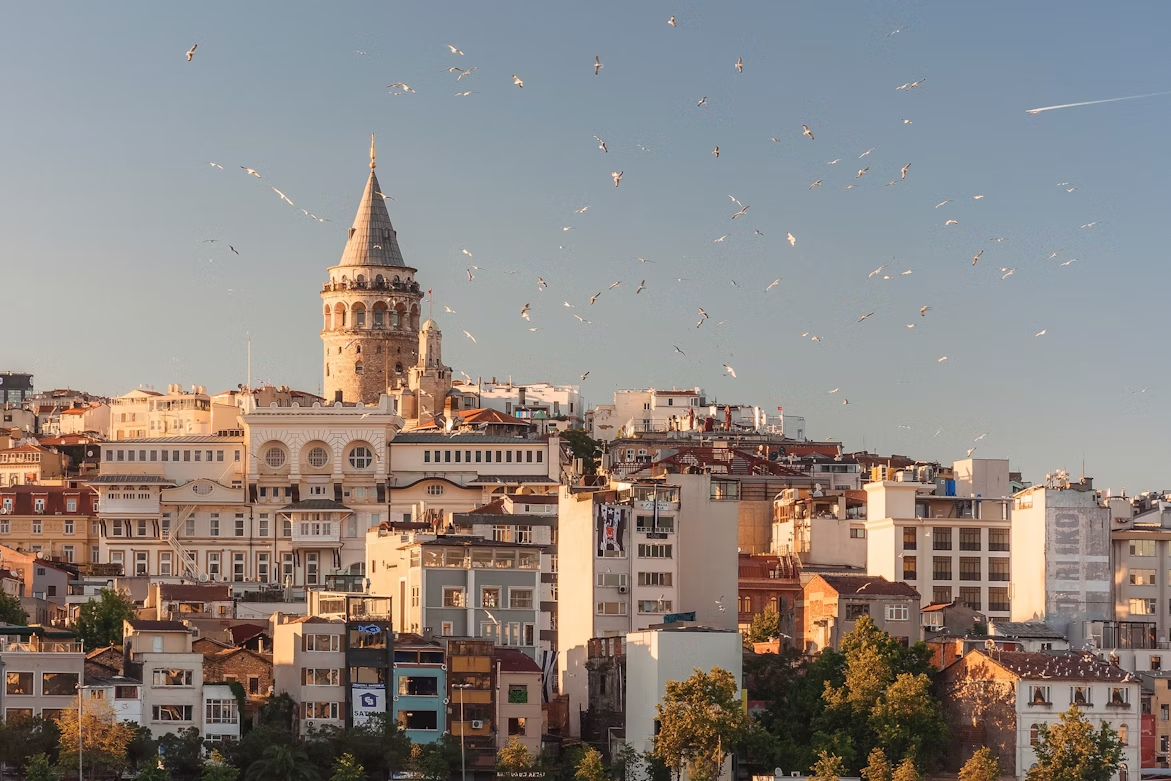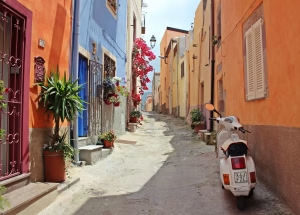Turkey is a treasure trove of cultural riches, and its markets and boutiques are no exception. Whether you’re exploring the bustling Grand Bazaar in Istanbul, strolling through seaside towns along the Aegean, or wandering the colorful markets of Cappadocia, you’ll find plenty of unique things to buy in Turkey that are perfect keepsakes or gifts.
In this shopping guide for Turkey, we’ll cover 25 must-buy items, from Turkish delight and handcrafted ceramics to evil eye charms and luxurious textiles, along with insider tips on where to find them and what they typically cost.
- 1. Turkish Delight (Lokum)
- 2. Evil Eye Charms (Nazar Boncuğu)
- 3. Hand-Painted Ceramics
- 4. Turkish Carpets & Kilims
- 5. Copperware & Metal Crafts
- 6. Turkish Tea & Tea Sets
- 7. Olive Oil & Olive-Based Soaps
- 8. Spices from the Spice Bazaar
- 9. Turkish Coffee & Coffee Sets
- 10. Handmade Jewelry (Ottoman Style)
- 11. Hammam Towels (Peshtemal)
- 12. Meerschaum Pipes
- 13. Leather Goods (Jackets, Bags, Slippers)
- 14. Turkish Sponges & Natural Loofahs
- 15. Calligraphy Art & Miniature Paintings
- 16. Pomegranate Products (Molasses, Oils)
- 17. Saffron & Herbal Teas
- 18. Traditional Musical Instruments
- 19. Copper Coffee Pots (Cezve)
- 20. Nazar Home Décor Items
- 21. Baklava from Gaziantep
- 22. Local Wines & Raki
- 23. Woven Scarves & Headscarves
- 24. Turkish Delight Gift Boxes
- 25. Mosaic Lamps
- Why Choose OneVasco?
- FAQs
1. Turkish Delight (Lokum)
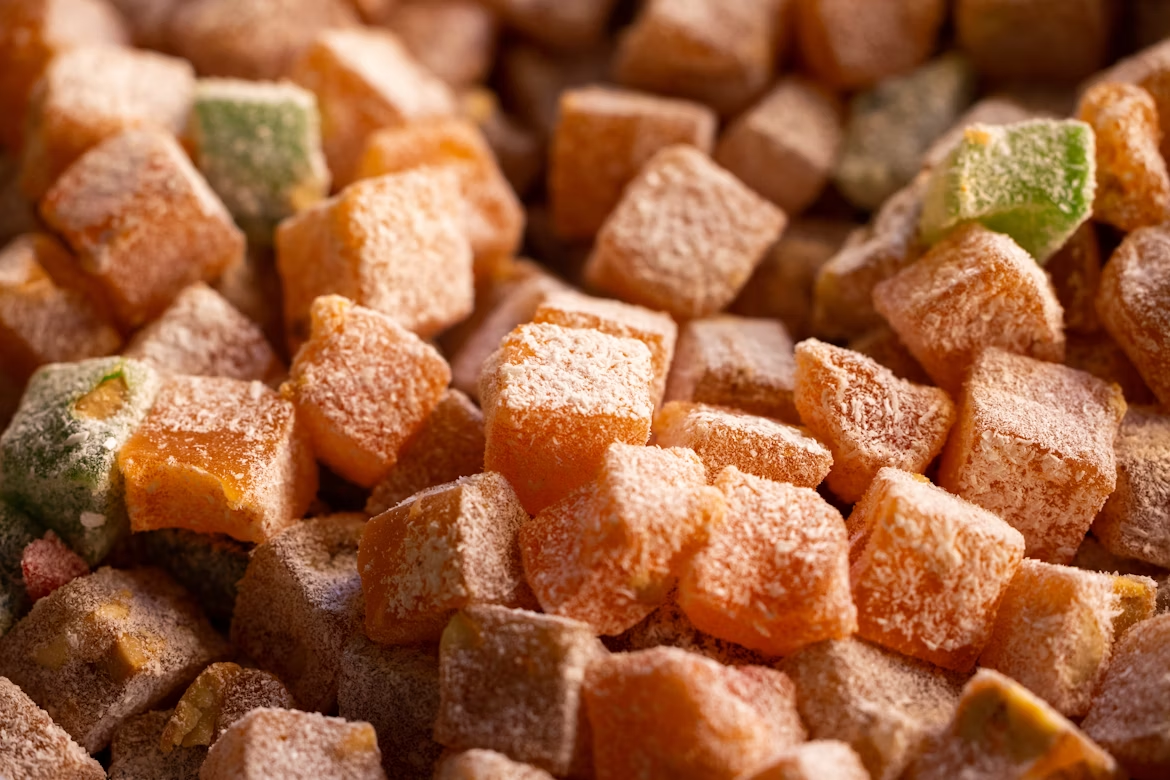
Turkish Delight, or lokum, is one of Turkey’s most beloved and iconic sweets. These chewy, sugar-dusted cubes come in a variety of flavors like rose, pomegranate, lemon, and pistachio often filled with chopped nuts or coated in coconut flakes.
Why Turkey: Invented in the Ottoman Empire, Turkish Delight is a centuries-old confection still made using traditional recipes in regions like Afyon and Istanbul.
Where to Buy:
- Hafiz Mustafa (Istanbul)
- Koska stores
- Spice Bazaar and Grand Bazaar
- Local sweet shops in Safranbolu or Gaziantep
Price Range: TRY 100 to TRY 300 (₹270 to ₹820) per box, depending on size and quality
Authenticity Identification: Genuine Turkish Delight is often labeled “El Yapımı” (handmade) or “Geleneksel Türk Lokumu” (traditional Turkish delight) on the packaging
Pro Tip: Choose varieties that use natural flavorings over artificial flavorings. Ask for a fresh sample before buying in bulk.
Suggested Read: Check Turkey Visa Status Online
2. Evil Eye Charms (Nazar Boncuğu)
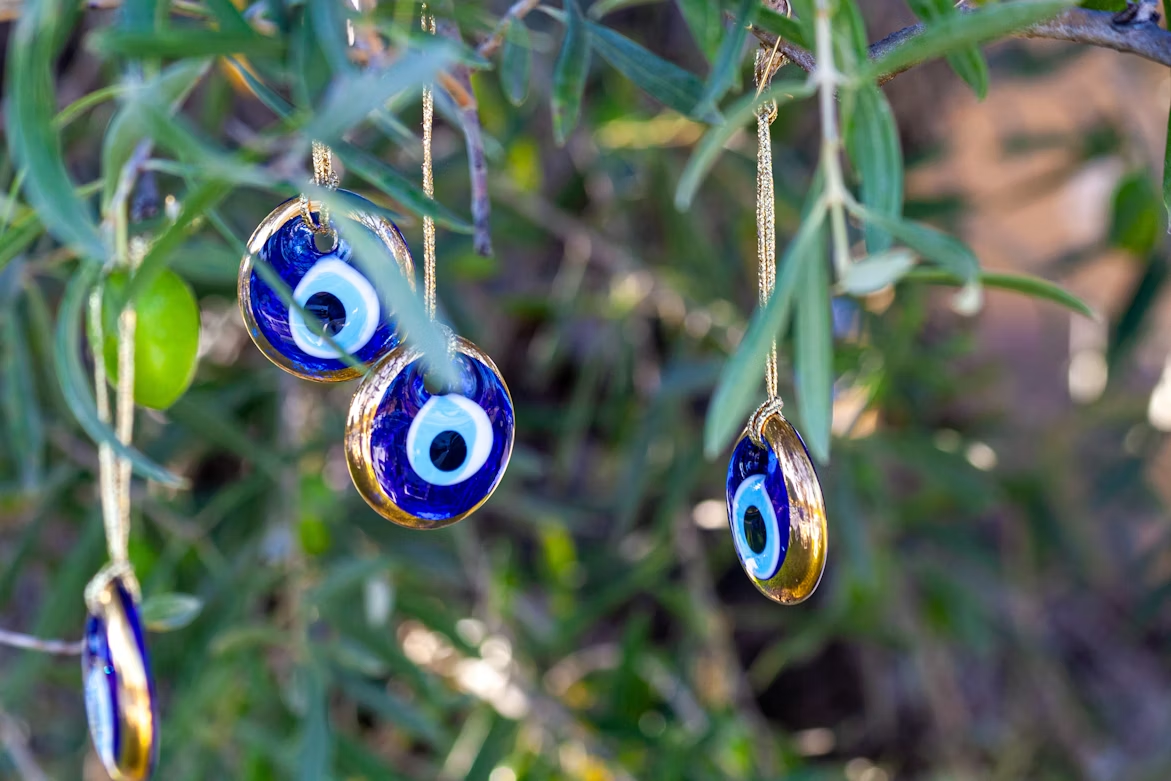
The evil eye charm, known as nazar boncuğu, is a ubiquitous and meaningful Turkish souvenir. Believed to ward off bad luck and jealousy, this deep-blue glass talisman is worn as jewelry, hung in homes, or placed in vehicles for protection.
Why Turkey: Rooted in ancient Anatolian beliefs, these amulets are still handblown by artisans in towns like Izmir and Görece.
Where to Buy:
- Grand Bazaar, Istanbul
- Gift shops in Cappadocia, Antalya, and Ephesus
- Street markets and coastal souvenir shops
Price Range: TRY 10 to TRY 150 (₹30 to ₹410) depending on size and material
Authenticity Identification: To identify an authentic evil eye charm, look for hand-blown glass with slight imperfections or air bubbles, which are natural signs of artisanal craftsmanship
Pro Tip: Opt for charms made with handblown glass instead of plastic for better quality and longevity, especially if you’re gifting them.
Suggested Read: Book a Visa Appointment for Turkey
3. Hand-Painted Ceramics
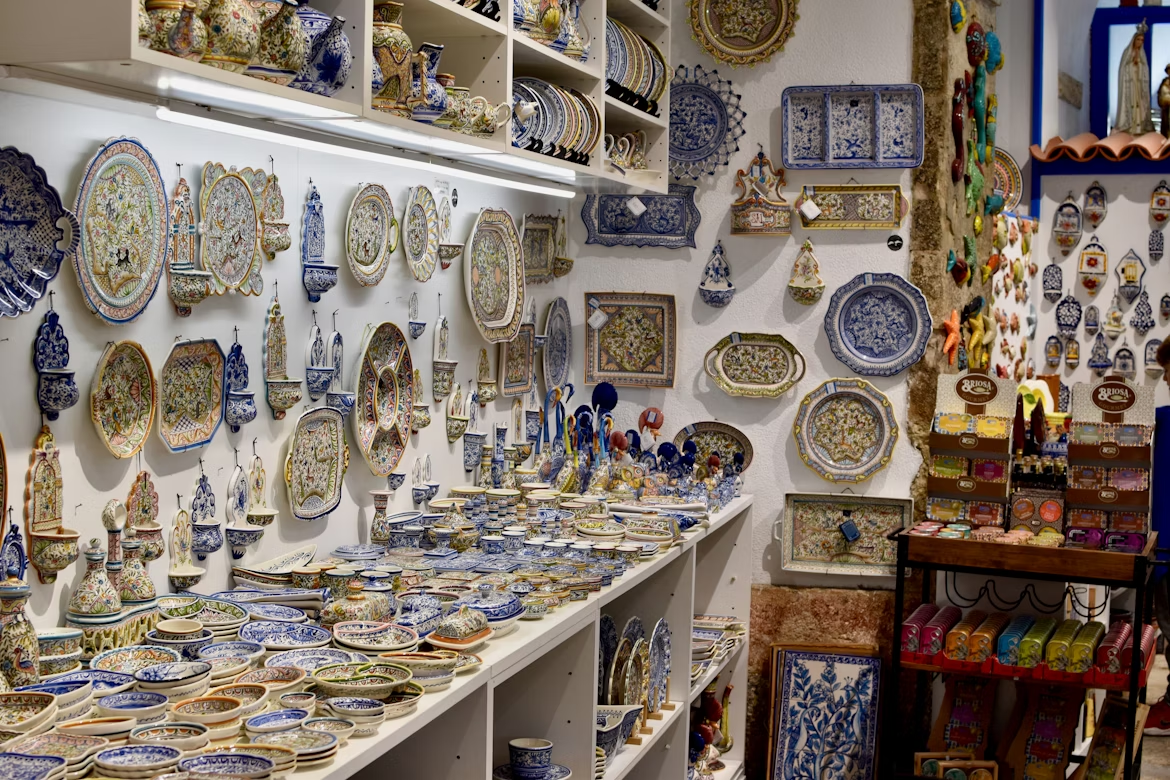
Turkish ceramics are a vibrant reflection of the country’s artistic legacy. The hand-painted plates, tiles, and bowls are often adorned with floral or Ottoman-inspired motifs in vivid blue, red, and green hues.
Why Turkey: The art of ceramic making in towns like Iznik and Kütahya dates back to the Seljuk and Ottoman periods and remains a celebrated tradition.
Where to Buy:
- Grand Bazaar & Arasta Bazaar (Istanbul)
- Avanos pottery workshops (Cappadocia)
- Local artisan studios in Kütahya and İznik
Price Range: TRY 150 to TRY 800 (₹410 to ₹2,200) depending on size and detail
Authenticity Identification: To ensure you’re purchasing authentic Turkish hand-painted ceramics, look for slight irregularities in the patterns or brush strokes, true signs of handwork
Pro Tip: Consider buying from ceramic workshops in Avanos or İznik, where you can see artists at work and even try painting your own tile.
4. Turkish Carpets & Kilims
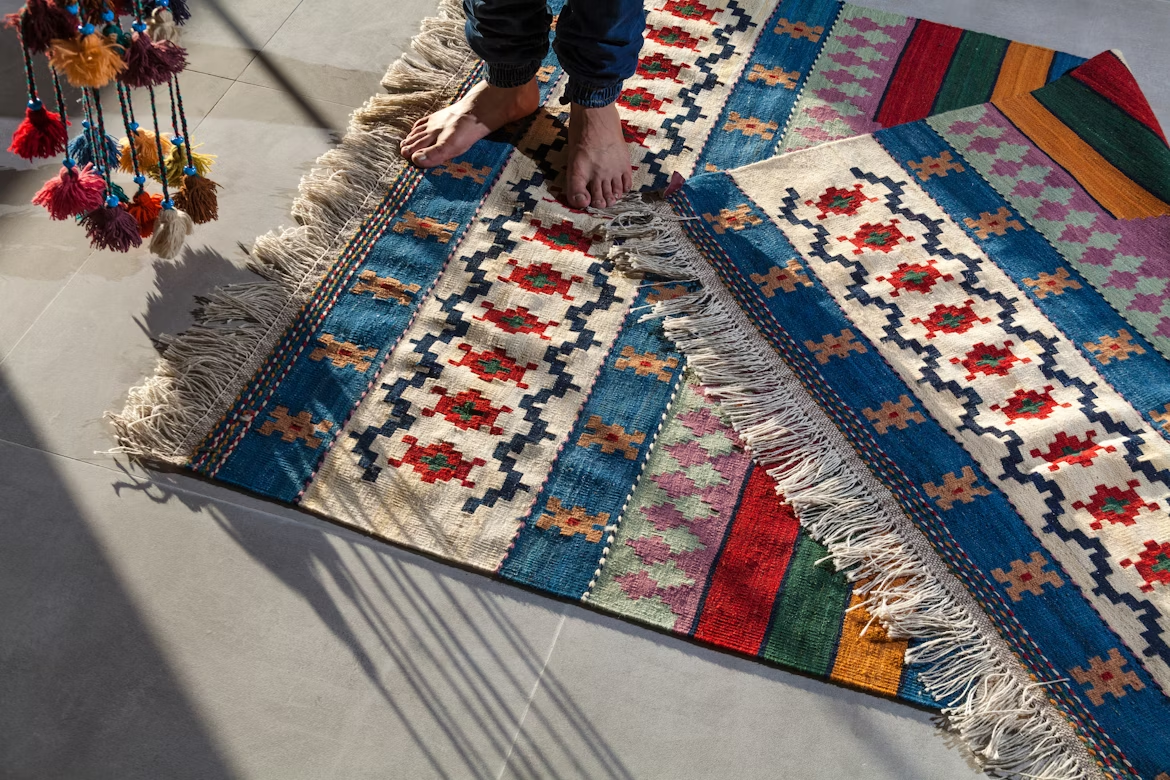
Turkish carpets and kilims are the most iconic items to purchase in Turkey. They are treasured worldwide for their intricate patterns and craftsmanship. While carpets are knotted and plush, kilims are flat-woven, lighter, and more geometric in design.
Why Turkey: Weaving is an age-old Turkish tradition passed down through generations, especially among nomadic communities.
Where to Buy:
- Istanbul’s Grand Bazaar
- Avanos and Göreme shops (Cappadocia)
- Rug centers in Konya, Antalya, and Uşak
Price Range: TRY 1,000 to TRY 10,000+ (₹2,700 to ₹27,000+) based on size and type
Authenticity Identification: To verify the authenticity of Turkish carpets and kilims, start by examining the weave; genuine handmade rugs have visible, slightly uneven knots on the back, while machine-made versions often have uniform stitching
Pro Tip: Always ask for a certificate of authenticity and feel free to bargain; it’s expected and part of the experience.
5. Copperware & Metal Crafts
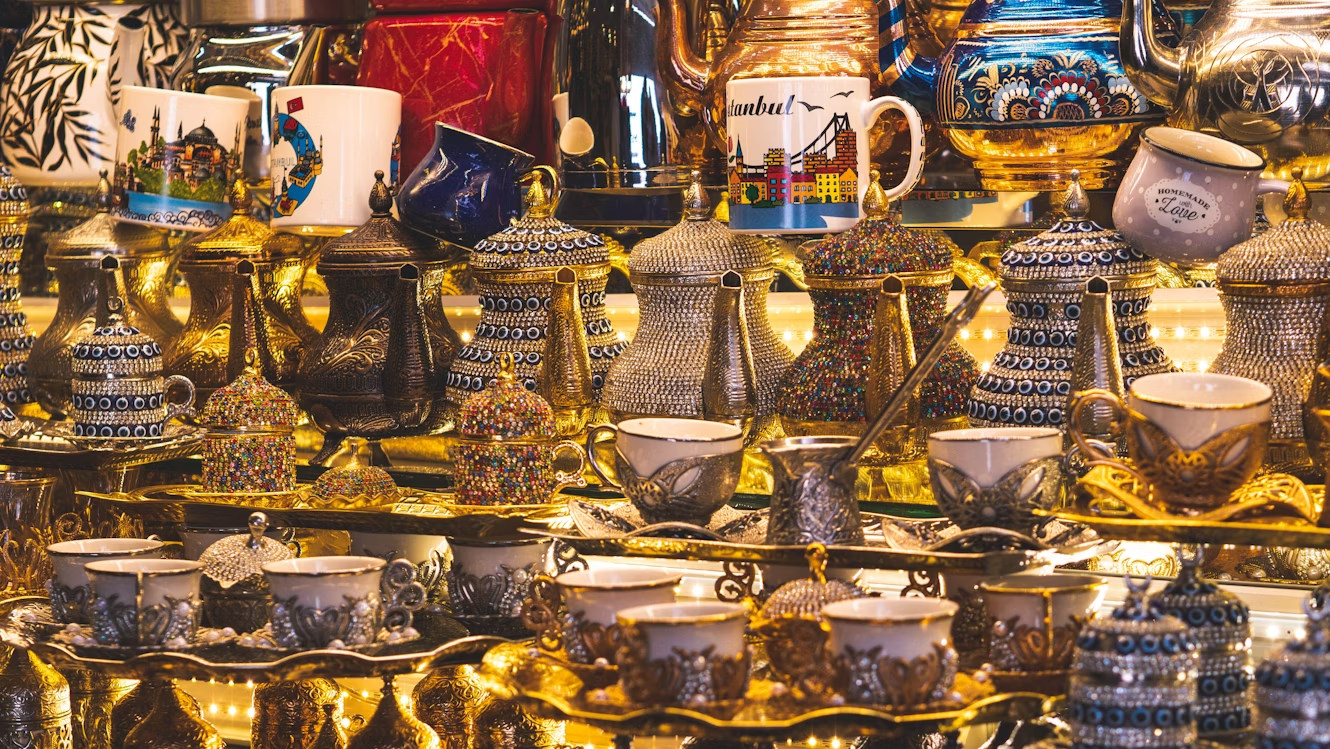
Copperware is an essential part of Turkish daily life and kitchenware from hammered trays and teapots to intricately carved plates and cezves (coffee pots). Valued for its heat conductivity and durability, authentic Turkish copperware is often hand-hammered and beautifully decorated by skilled artisans.
Why Turkey: The towns of Gaziantep and Kahramanmaraş are famous for their centuries-old metal crafting techniques.
Where to Buy:
- Copper Bazaar in Gaziantep
- Beypazarı town shops
- Grand Bazaar metal craft stalls
Price Range: TRY 200 to TRY 1,500 (₹550 to ₹4,100)
Authenticity Identification: To identify authentic Turkish copperware, look for signs of hand-hammering genuine items will display subtle irregularities or tiny dents from manual work, especially on the surface of trays, pots, and cezve.
Pro Tip: If you’re buying cookware, ensure the item is tin-lined inside to make it food-safe.
Suggested Read: Top 15 Markets in Turkey
6. Turkish Tea & Tea Sets
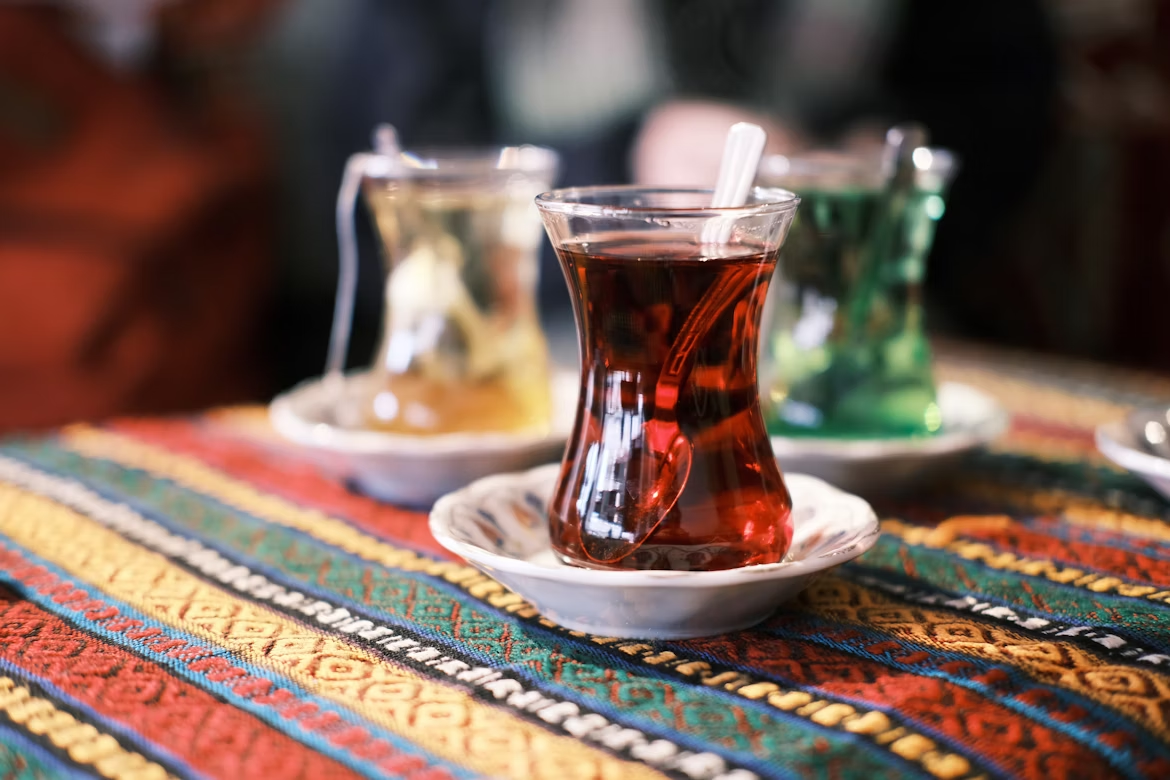
Tea, or çay, is a cornerstone of Turkish hospitality. Whether you’re in a bustling city or a mountain village, you’ll find tea served in delicate tulip-shaped glasses with a cube of sugar on the side.
Why Turkey: Turkey is among the world’s largest tea consumers, especially of black tea from the Rize region near the Black Sea.
Where to Buy:
- Spice Bazaar and Çaykur stores
- Grocery shops across Turkey
- Gift shops selling ornate tea sets
Price Range:
- Tea: TRY 50 to TRY 150 (₹140 to ₹410)
- Sets: TRY 200 to TRY 600 (₹550 to ₹1,650)
Authenticity Identification: To ensure authenticity when buying Turkish tea, check the packaging for the Çaykur brand or other reputable local producers like Doğadan and Mahmood, which clearly state “Made in Turkey” and often highlight the Rize origin
Pro Tip: Pick up a tulip-shaped glass set to enjoy the full Turkish tea-drinking experience back home; it enhances the flavor and tradition.
7. Olive Oil & Olive-Based Soaps
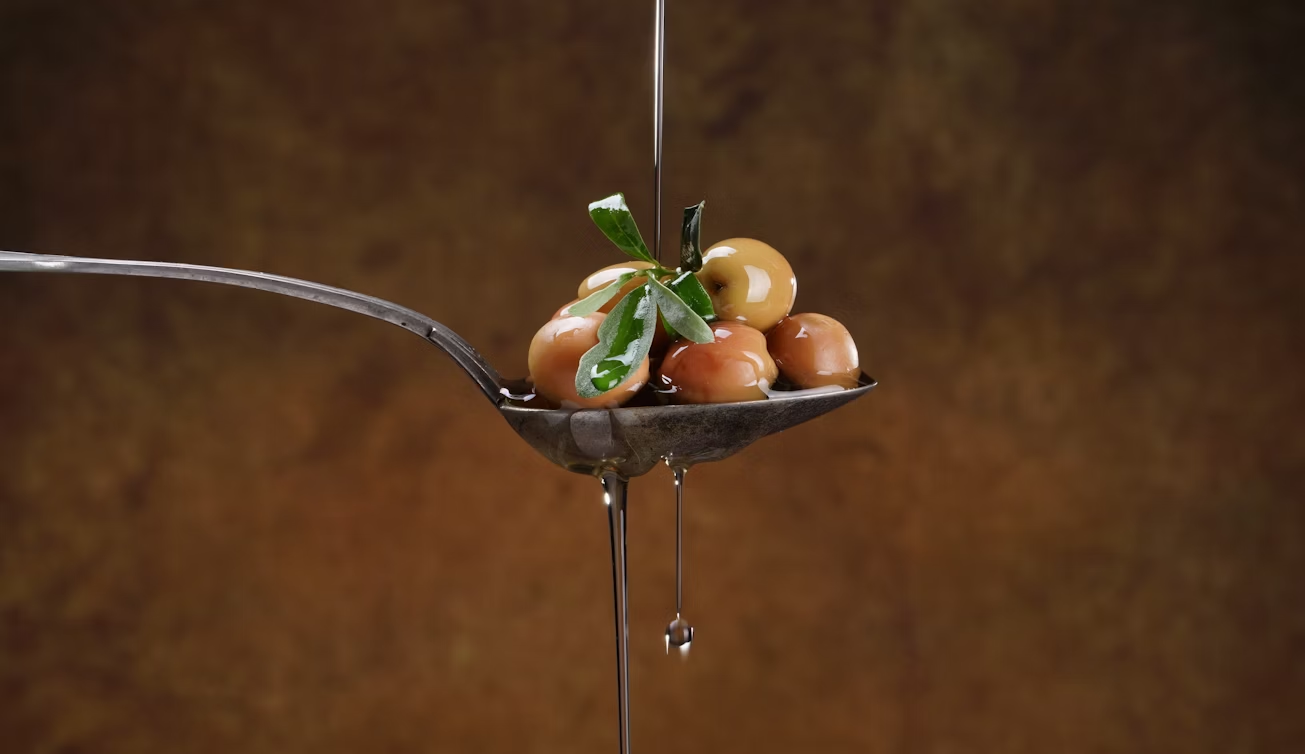
Turkey’s Aegean coast is dotted with olive groves producing high-quality oils and skincare products. Pure olive oil soap is gentle, moisturizing, and free of harsh chemicals. These traditional soaps are often considered the best handmade items from Turkey.
Why Turkey: Olive oil has been used in Turkish beauty and cuisine for millennia, particularly in the Ayvalık and Edremit regions.
Where to Buy:
- Shops in Ayvalık, Bodrum, and İzmir
- Organic markets
- Local bath and beauty boutiques
Price Range:
- Soaps: TRY 30 to TRY 100 (₹80 to ₹270)
- Olive oil: TRY 100 to TRY 400 (₹270 to ₹1,100)
Authenticity Identification: To verify the authenticity of Turkish olive oil, look for bottles labeled “cold-pressed” and “extra virgin,” ideally with a geographic indication such as Ayvalık, Edremit, or Aegean Region
Pro Tip: Olive oil soaps make perfect carry-on souvenirs as they’re solid, lightweight, and TSA-compliant
Suggested Read: Nightlife In Turkey
8. Spices from the Spice Bazaar
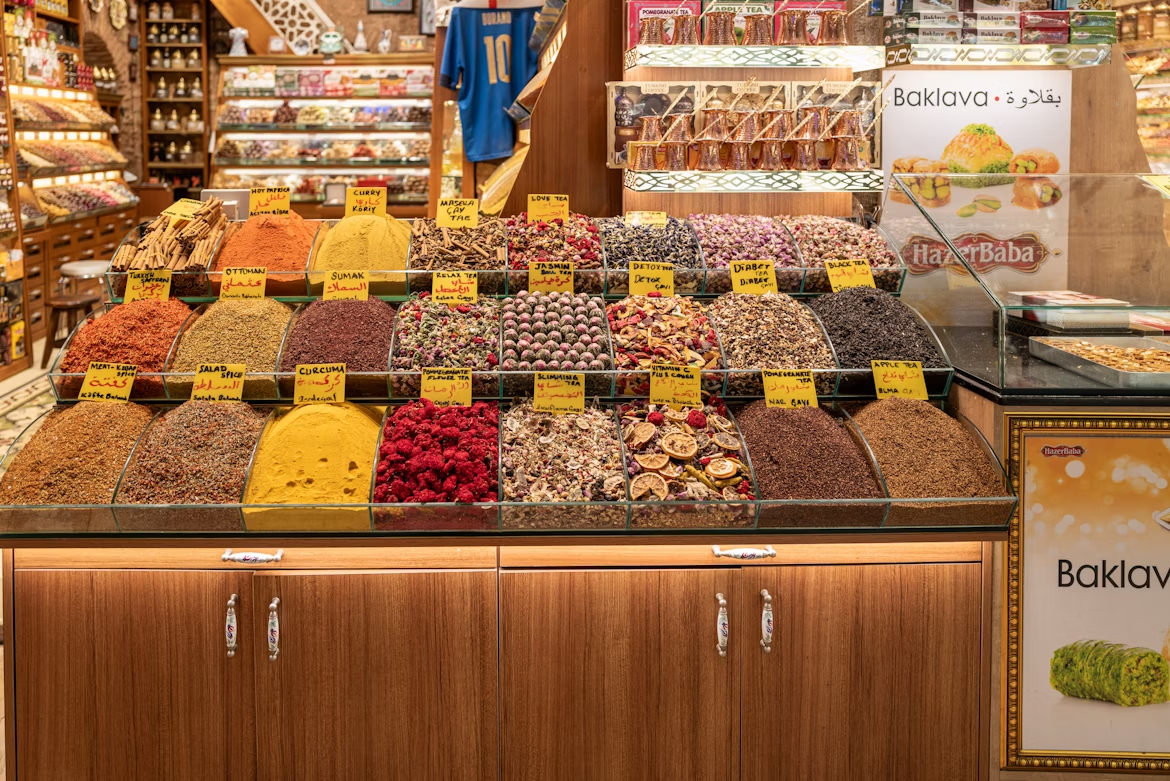
Spices are a sensory highlight of any Turkish market. From deep red pul biber (crushed chili) to golden saffron and aromatic sumac, the flavors are rich and regionally distinct. Many are sun-dried and ground by hand, preserving their potency and traditional character.
Why Turkey: As a historic trading hub on the Silk Road, Turkey’s spice culture blends Central Asian, Mediterranean, and Middle Eastern influences.
Where to Buy:
- Spice Bazaar (Mısır Çarşısı), Istanbul
- Local farmers’ markets
- Shops in Gaziantep and Şanlıurfa
Price Range: TRY 50 to TRY 500 (₹140 to ₹1,350) depending on spice and quantity
Authenticity Identification: To ensure the authenticity of Turkish spices, choose vendors who specialize in locally sourced and sun-dried ingredients rather than mass-produced mixes
Pro Tip: Request vacuum-sealed packaging if you’re buying in bulk; it preserves freshness and is travel-friendly.
9. Turkish Coffee & Coffee Sets
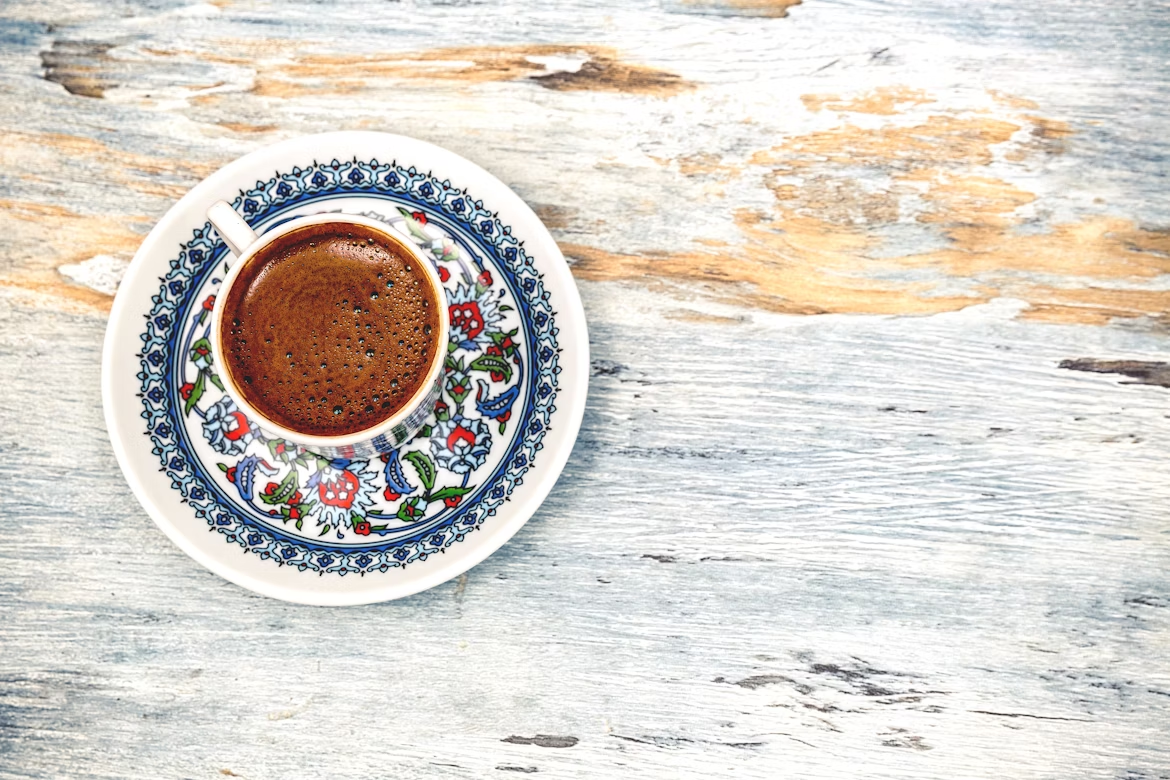
Strong, aromatic, and unfiltered, Turkish coffee is both a beverage and a cultural ritual. It’s often served with a piece of Turkish delight and read fortunes from the grounds left behind. Recognized by UNESCO as Intangible Cultural Heritage, it symbolizes hospitality, conversation, and tradition in Turkish society.
Why Turkey: Listed by UNESCO as intangible heritage, Turkish coffee is a traditional social custom dating back to the Ottoman court.
Where to Buy:
- Kurukahveci Mehmet Efendi (Istanbul)
- Local coffee roasters in Kadıköy and İzmir
- Gift shops with copper cezve sets
Price Range:
- Coffee: TRY 50 to TRY 150 (₹140 to ₹410)
- Sets: TRY 300 to TRY 1,000 (₹820 to ₹2,700)
Authenticity Identification: To ensure authenticity when purchasing Turkish coffee and coffee sets, look for brands like Kurukahveci Mehmet Efendi, which has been a trusted name since 1871 and is often considered the gold standard for traditional Turkish coffee
Pro Tip: Get a set that includes a cezve (pot), cups, and a small serving tray for a complete at-home Turkish coffee experience.
Suggested Read: Solo Trip in Turkey
10. Handmade Jewelry (Ottoman Style)
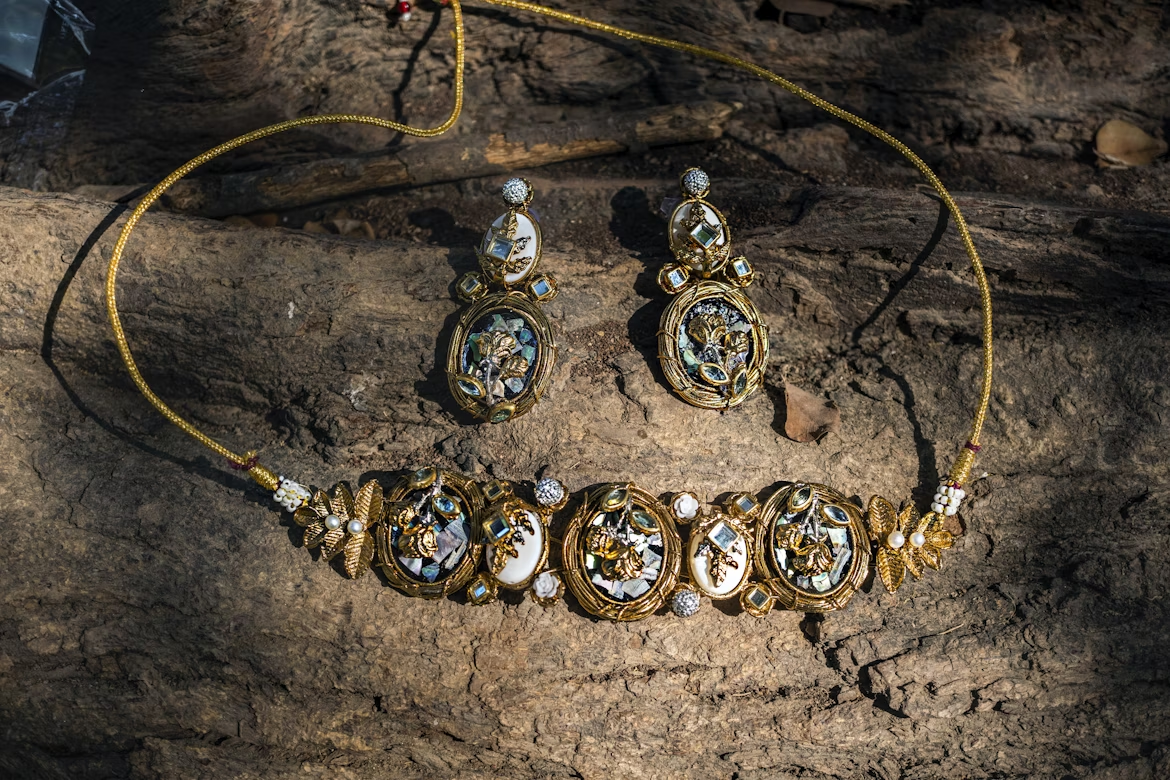
Turkish jewelry draws from centuries of imperial grandeur, with pieces often showcasing intricate filigree work, colorful stones, and vintage designs reminiscent of the Ottoman era.
Why Turkey: Istanbul’s Grand Bazaar and historical jeweler families continue the fine tradition of goldsmithing and silversmithing.
Where to Buy:
- Grand Bazaar jewelry arcades
- Boutique ateliers in Sultanahmet and Nişantaşı
- Antique shopping in Turkey, Beyoğlu
Price Range: TRY 500 to TRY 5,000+ (₹1,350 to ₹13,500+) depending on material
Authenticity Identification: To verify the authenticity of Ottoman-style handmade jewelry, look for detailed filigree work and the use of semi-precious stones such as turquoise, onyx, ruby, or amber set in sterling silver or gold
Pro Tip: Avoid items labeled “silver plated” if you want long-term quality, go for sterling silver with hallmark stamps.
Suggested Read: Turkey With Kids
11. Hammam Towels (Peshtemal)
Peshtemal, or Turkish hammam towels, are lightweight, fast-drying, and beautifully woven textiles traditionally used in Turkish baths. Today, they are also used as beach towels, scarves, throws, and even sarongs.
Why Turkey: Rooted in Ottoman bathhouse culture, these towels are handmade using soft cotton, linen, or bamboo fibers and often feature striped patterns with knotted fringes.
Where to Buy:
- Grand Bazaar and Arasta Bazaar (Istanbul)
- Hammam shops in Bursa and Pamukkale
- Boutique textile stores in Bodrum and Alaçatı
Price Range: TRY 150 to TRY 500 (₹410 to ₹1,350) depending on fabric and size
Authenticity Identification: To ensure you’re buying the real thing, check the label or ask the vendor if the towel is made in Turkey, specifically in weaving regions like Denizli
Pro Tip: Buy a few in different colors; they pack light and double as scarves, table throws, or beach mats.
12. Meerschaum Pipes

Made from a rare white mineral called sepiolite, meerschaum pipes are hand-carved smoking instruments known for their beauty and smoothness. Each pipe darkens with use, developing a unique patina over time.
Why Turkey: The finest meerschaum deposits are found near Eskişehir, and Turkish artisans are world-renowned for their detailed carving techniques.
Where to Buy:
- Eskişehir artisan shops
- Tobacco shops in Istanbul and Ankara
- Select stalls in the Grand Bazaar
Price Range: TRY 300 to TRY 2,000+ (₹820 to ₹5,500+) depending on craftsmanship
Authenticity Identification: To identify a genuine piece, check for a lightweight feel, a chalky matte texture, and slight porosity, which distinguishes it from plastic or resin imitations
Pro Tip: Ask the seller if the pipe was carved in Eskişehir, the most respected region for authentic meerschaum artistry.
13. Leather Goods (Jackets, Bags, Slippers)
Turkish leather products are praised for their quality and affordability. From supple jackets and handmade slippers to intricately stitched bags and wallets, the craftsmanship is top-notch.
Why Turkey: With a long history in leather tanning and export, cities like Istanbul and Izmir are major hubs for leather artisans and workshops.
Where to Buy:
- Istanbul’s Leather Avenue (Zeytinburnu)
- Grand Bazaar leather sections
- Leather boutiques in Kusadasi and Antalya
Price Range: TRY 500 to TRY 5,000 (₹1,350 to ₹13,500) depending on item and leather type
Authenticity Identification: The stitching should be even and hand-finished, especially around the edges and seams. Genuine items may carry the scent of natural leather; distinctly earthy, not chemically treated
Pro Tip: Visit Zeytinburnu in Istanbul early in the day for better deals; many shops offer morning discounts.
Suggested Read: Turkey Visa Extension for Indians
14. Turkish Sponges & Natural Loofahs

Natural sea sponges and loofahs from Turkey’s Aegean coast are eco-friendly and ideal for bathing or exfoliating. They’re a perfect wellness souvenir to bring home. Known for their durability and softness, they’re also a sustainable alternative to synthetic bath products.
Why Turkey: Harvested in the coastal waters near Bodrum and Marmaris, these products are traditionally used in Turkish hammams and homes.
Where to Buy:
- Bodrum Marina and local bazaars
- Natural beauty shops in İzmir and Antalya
- Hammam stores and bath boutiques
Price Range: TRY 50 to TRY 250 (₹140 to ₹690) depending on type and size
Authenticity Identification: Genuine loofahs are made from the dried fibrous interior of the loofah gourd and have a coarse, net-like structure ideal for exfoliation. Authentic versions often come unbleached, maintaining a beige or light tan color
Pro Tip: Natural loofahs expand and soften when soaked; choose one with a rope loop for easy drying
15. Calligraphy Art & Miniature Paintings
Turkish calligraphy and miniatures blend Islamic art and Ottoman heritage into visually stunning forms. Whether it’s Arabic script on parchment or scenes from palace life, these works are detailed and expressive.
Why Turkey: Ottoman calligraphy reached artistic heights during the imperial era, and today’s artists continue the tradition using authentic tools and materials.
Where to Buy:
- Islamic arts galleries in Istanbul’s Sultanahmet
- Workshops in Fatih or Beyazit
- Calligraphy stalls at cultural festivals
Price Range: TRY 300 to TRY 1,500 (₹820 to ₹4,100) depending on size and artist
Authenticity Identification: Genuine pieces often feature imperfections in brush stroke thickness, signaling the human touch, unlike mass-printed replicas
Pro Tip: For a more personal souvenir, request your name or favorite quote written in Arabic calligraphy by local artists.
Suggested Read: Turkey on a Budget
16. Pomegranate Products (Molasses, Oils)

Pomegranate, or nar, is a cherished fruit in Turkish cuisine and culture. Its antioxidant-rich molasses is used in cooking and salads, while the oil is prized in skincare for its anti-aging properties.
Why Turkey: The southeastern region, especially Gaziantep and Şanlıurfa, is known for its high-quality pomegranates.
Where to Buy:
- Gourmet food shops
- Spice Bazaar and farmers’ markets
- Natural beauty stores and apothecaries
Price Range:
- Molasses: TRY 60 to TRY 200 (₹160 to ₹550)
- Oils: TRY 100 to TRY 300 (₹270 to ₹820)
Authenticity Identification: Authentic Turkish pomegranate molasses should have a dark, almost black hue with a thick, syrupy consistency and a tart-sweet flavor, a sign it’s made from pure, reduced pomegranate juice without added sugar or preservatives
Pro Tip: Keep molasses in a sealed bottle and wrap it in clothing in your luggage; it travels well if packed securely.
17. Saffron & Herbal Teas

Turkish saffron, while different from Iranian saffron, is popular for coloring dishes and teas. Meanwhile, herbal teas like linden, sage, and apple are staples in every Turkish home.
Why Turkey: The town of Safranbolu is named after saffron, and herbal remedies are a deep-rooted tradition in Turkish folk medicine.
Where to Buy:
- Spice Bazaar, Istanbul
- Herbal shops (aktar) across the country
- Specialty tea shops in Safranbolu, Antalya, and Bursa
Price Range:
- Saffron: TRY 300 to TRY 800 (₹820 to ₹2,200)
- Teas: TRY 50 to TRY 200 (₹140 to ₹550)
Authenticity Identification: To test purity, drop a few threads into warm water: they should gradually release color (not instantly) and maintain shape
Pro Tip: If you’re buying saffron, a small amount goes a long way; choose threads over powder for better quality control.
Suggested Read: Turkey In February
18. Traditional Musical Instruments

Turkey has a rich musical heritage, and traditional instruments like the saz (long-necked lute), ney (reed flute), and various drums are both functional and decorative. These instruments are often used in folk music, Sufi ceremonies, and regional festivals, reflecting centuries of cultural evolution.
Why Turkey: These instruments are tied to Turkish folk music, Sufi rituals, and Ottoman court culture.
Where to Buy:
- Music shops in Kadıköy (Istanbul)
- Instrument makers in Ankara and Konya
- Cultural fair stalls and local music festivals
Price Range: TRY 500 to TRY 3,000 (₹1,350 to ₹8,200) depending on instrument and build
Authenticity Identification: Authentic Turkish musical instruments are typically handcrafted by artisans using traditional materials and techniques passed down through generations
Pro Tip: If you’re not a player, buy a mini version of the instrument as a decorative piece or wall hanging.
19. Copper Coffee Pots (Cezve)

Cezve is the traditional long-handled pot used to brew rich, foamy Turkish coffee. These pots are typically made from copper and lined with tin for safe use. The unique shape helps create the perfect foam, which is a hallmark of authentic Turkish coffee.
Why Turkey: Turkish coffee preparation is an art form, and authentic cezve is often beautifully decorated and hand-hammered.
Where to Buy:
- Copperware shops in Gaziantep or Istanbul
- Spice Bazaar and Grand Bazaar
- Kitchenware stores and gift boutiques
Price Range: TRY 100 to TRY 600 (₹270 to ₹1,650) depending on size and decoration
Authenticity Identification: Authentic pieces often have a thick, heavy base that ensures even heat distribution, and the handle is usually made of solid brass or carved hardwood, firmly riveted or welded into the pot for durability
Pro Tip: Match the pot size to your household; 1-cup cezves brew best for one or two people at a time.
20. Nazar Home Décor Items

Beyond jewelry, the nazar symbol features in Turkish home décor, from wall hangings and coasters to mosaic lamps and ceramic tiles. It’s both a protective charm and a stylish design motif.
Why Turkey: The belief in the evil eye spans thousands of years, and incorporating it into everyday objects keeps the tradition alive.
Where to Buy:
- Souvenir shops in Antalya, Fethiye, and Bodrum
- Grand Bazaar artisan stalls
- Online and boutique home décor stores
Price Range: TRY 50 to TRY 800 (₹140 to ₹2,200) depending on size and material
Authenticity Identification: Genuine items often come from workshops in Görece or Izmir, known for their long-standing evil eye craftsmanship
Pro Tip: Ask for protective wrapping or buy flat versions (like ceramic tiles) for easier transport.
21. Baklava from Gaziantep

Baklava is one of Turkey’s most iconic desserts, layers of thin, buttery pastry filled with crushed pistachios or walnuts and soaked in syrup. The best versions come from Gaziantep, a city officially recognized by UNESCO for its culinary heritage.
Why Turkey: Turkish baklava uses premium ingredients like Antep pistachios and hand-rolled phyllo dough. The dessert is a symbol of hospitality and celebration.
Where to Buy:
- İmam Çağdaş or Koçak Baklava (Gaziantep)
- Karaköy Güllüoğlu (Istanbul)
- Specialty baklava shops across Turkey
Price Range: TRY 200 to TRY 800 per kilo (₹550 to ₹2,200)
Authenticity Identification: Authentic Turkish baklava, especially from Gaziantep, is distinguished by its use of Antep pistachios (a registered regional product), which have a vivid green color and a rich, nutty aroma
Pro Tip: Always ask for freshly baked baklava, and if you’re flying out, choose vacuum-packed boxes for freshness.
22. Local Wines & Raki
Turkey’s winemaking tradition dates back to antiquity, and local varietals are gaining global recognition. Raki, the anise-flavored national spirit, is traditionally served with seafood and water, turning it milky white.
Why Turkey: Regions like Cappadocia, Thrace, and the Aegean produce bold red and crisp white wines. Raki, meanwhile, is an essential part of Turkish culinary culture.
Where to Buy:
- Kavaklıdere or Doluca wine boutiques
- Major supermarkets like Migros or Carrefour
- Duty-free shops and vineyard cellars
Price Range:
- Wines: TRY 200 to TRY 800 (₹550 to ₹2,200)
- Raki: TRY 350 to TRY 1,000 (₹960 to ₹2,700)
Authenticity Identification: Authentic Turkish wines are best identified by recognized regional labels such as Kalecik Karası, Boğazkere, Öküzgözü, and Narince, each tied to a specific terroir
Pro Tip: Most vineyards in Cappadocia offer tastings; try before you buy and ask about regional grape varieties.
23. Woven Scarves & Headscarves

Woven scarves and eşarps (headscarves) are both stylish and culturally significant souvenirs. These traditional souvenirs in Turkey often feature Anatolian or Ottoman patterns, making them wearable art and perfect gifts for fashion lovers and cultural enthusiasts alike.
Why Turkey: Turkish textile craftsmanship is among the oldest in the world, especially in regions like Bursa and Denizli.
Where to Buy:
- Textile shops in Bursa and Istanbul
- Grand Bazaar and Arasta Bazaar
- Street stalls in Cappadocia and Konya
Price Range: TRY 100 to TRY 500 (₹270 to ₹1,350)
Authenticity Identification: Genuine items typically feature hand-rolled or neatly hemmed edges, traditional Anatolian or Ottoman floral motifs, and sometimes carry woven labels indicating their region of origin, especially from Bursa, a hub of silk production
Pro Tip: Buy at least one scarf from a Bursa shop to experience the silky texture the region is famed for.
24. Turkish Delight Gift Boxes

While Turkish Delight is widely available, gift boxes elevate the experience. These elegant packages often combine assorted flavors and come in beautiful, Ottoman-style tins or velvet-lined boxes.
Why Turkey: It’s not just a sweet, it’s part of Turkish hospitality. Gift boxes make it easy to share this tradition back home.
Where to Buy:
- Hafiz Mustafa, Koska, and Ali Muhiddin Hacı Bekir shops
- Istanbul Airport duty-free
- High-end confectioners in tourist towns
Price Range: TRY 200 to TRY 600 (₹550 to ₹1,650)
Authenticity Identification: Premium brands like Hafiz Mustafa, Koska, or Ali Muhiddin Hacı Bekir usually label their boxes with production and expiration dates, ingredient transparency (e.g., real fruit, beet sugar, no artificial flavors), and certification stamps like “ISO” or “TSE” (Turkish Standards Institution)
Pro Tip: These make great airport gifts; grab a couple of souvenir tins at duty-free to save space in your suitcase.
Suggested Read: Plan Your Dream Honeymoon in Turkey
25. Mosaic Lamps

Turkish mosaic lamps are dazzling décor items crafted from colored glass and beads arranged in geometric patterns. These lanterns add a warm, exotic touch to any space.
Why Turkey: The art of mosaic lamp-making has roots in Byzantine and Ottoman design, especially in regions like Cappadocia and Istanbul.
Where to Buy:
- Mosaic lamp shops in Sultanahmet or the Grand Bazaar
- Avanos artisan workshops in Cappadocia
- Handicraft stores in Antalya, Izmir, and Bodrum
Price Range: TRY 300 to TRY 2,000+ (₹820 to ₹5,500+) depending on size and complexity
Authenticity Identification: A genuine lamp will have a metal base made of brass or bronze, not lightweight alloys
Pro Tip: Choose plug types and voltages compatible with your home country; most shops offer EU and US-compatible versions.
Why Choose OneVasco?
OneVasco makes visa applications effortless. Our expert team manages the entire process, allowing you to focus on your journey.
Enjoy stress-free travel with fast visa approvals.
- Expert and Personalized Support
- Efficient and Hassle-Free Process
- Real-Time Tracking and Updates
- Transparent Communication
- Trusted by Millions
FAQs
1. Where to shop in Turkey for authentic souvenirs?
You can find authentic Turkish souvenirs in cities like Istanbul, Cappadocia, Gaziantep, Izmir, and Bursa. Look for local bazaars, artisan workshops, and family-run stores instead of mass-market tourist stalls. The Grand Bazaar, Spice Bazaar, and Avanos pottery villages are excellent starting points.
2. What are the top markets in Turkey for tourists?
Some of the top markets in Turkey include:
- Grand Bazaar (Istanbul) – Ideal for jewelry, carpets, lamps, and ceramics
- Spice Bazaar (Istanbul) – Great for spices, teas, and sweets
- Kemeralti Bazaar (Izmir) – Known for textiles and local crafts
- Çarşamba Market (Fatih, Istanbul) – A local favorite for clothing and fresh produce
- Bodrum Bazaar – Popular for summer wear, sandals, and beach accessories
3. What Turkey is famous for in shopping?
Turkey is famous for shopping items like Turkish delight, baklava, handwoven carpets, ceramics, evil eye charms, mosaic lamps, and leather goods. It’s also well known for artisanal products such as olive oil soaps, silk scarves, and handmade jewelry with Ottoman influences.
4. Are prices fixed in Turkish markets?
In traditional bazaars and street markets, bargaining is expected. Vendors often quote higher prices initially, so tourists should politely negotiate. However, in boutiques, department stores, and airport shops, prices are usually fixed.
5. What are useful shopping tips for Turkey tourists?
Some helpful shopping tips for Turkey tourists include:
- Carry cash (TRY) for smaller vendors
- Always check product quality and labeling
- Look for artisan certifications or origin tags
- Be prepared to bargain in open-air markets
- Compare prices across a few shops before buying
6. Can I bring Turkish food products back home?
Yes, most packaged famous food items to buy in Turkey, like Turkish delight, baklava, spices, and tea, are travel-safe. Always check your home country’s customs regulations for items like raki, cheese, or olive oil, especially if they are liquid, perishable, or alcoholic in nature.
7. Is it better to shop in bazaars or malls in Turkey?
Best malls in Turkey offer convenience, international brands, and fixed pricing, but they lack the charm of traditional Turkish markets. Bazaars offer a more authentic experience with unique and handcrafted things to buy in Turkey.
8. Where to buy Turkish carpets or kilims?
Visit Istanbul’s Grand Bazaar, Cappadocia’s Avanos, Uşak, or Konya for reputable rug dealers. Always ask for a certificate of authenticity, and ensure that your purchase includes shipping and customs documentation if you’re having it sent home.





